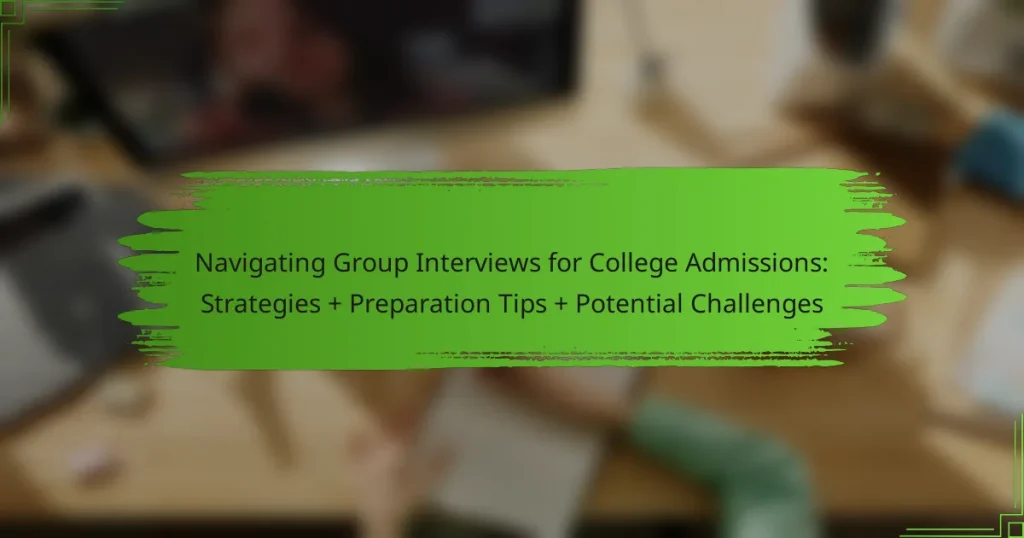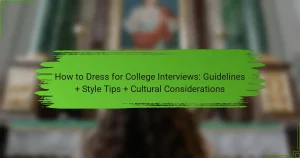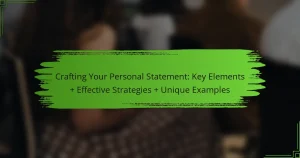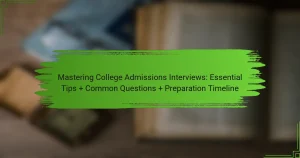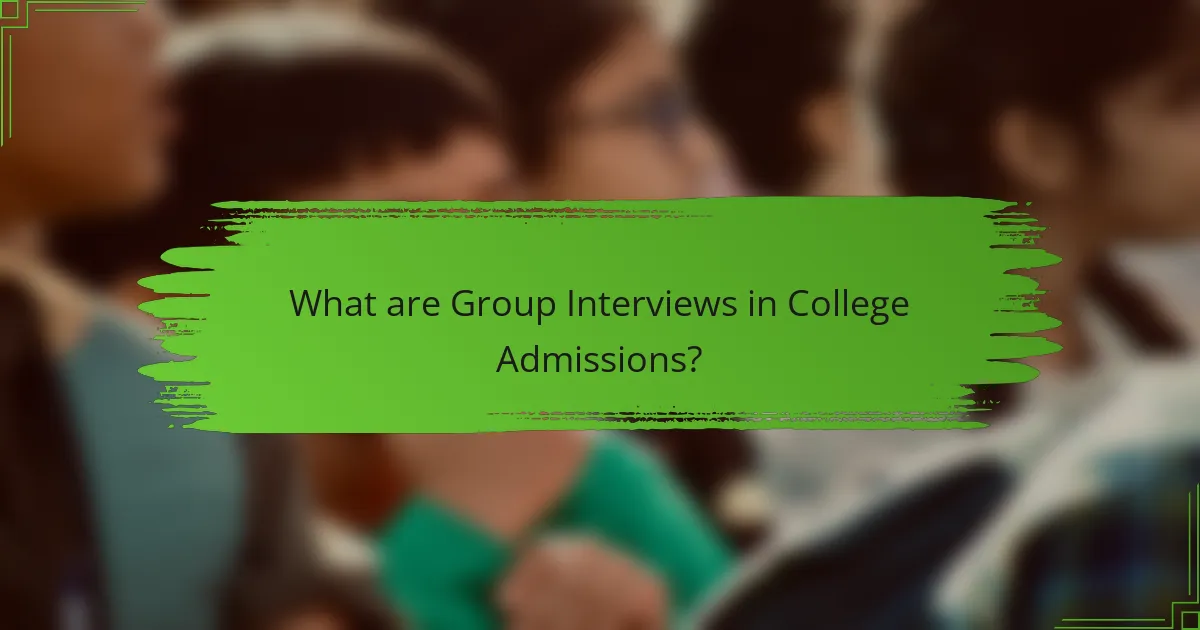
What are Group Interviews in College Admissions?
Group interviews in college admissions are evaluations where multiple candidates are assessed simultaneously. This format allows admissions officers to observe interactions among applicants. Colleges use group interviews to gauge teamwork, communication skills, and leadership potential. Typically, candidates engage in discussions or activities together. This setting can reveal how individuals contribute to group dynamics. Group interviews often last from 30 minutes to an hour. They may include specific prompts or scenarios for candidates to address collectively. Overall, group interviews provide a unique perspective on applicants beyond individual interviews.
How do Group Interviews differ from Traditional Interviews?
Group interviews involve multiple candidates being assessed simultaneously, while traditional interviews focus on one candidate at a time. In group interviews, candidates interact with each other, showcasing teamwork and communication skills. Traditional interviews typically allow for more in-depth individual responses. Group interviews can include panelists who evaluate candidates collectively, whereas traditional interviews often feature a single interviewer. The dynamics in group interviews can lead to different behavioral observations compared to traditional settings. Group interviews may also incorporate group tasks or discussions to assess collaboration. In contrast, traditional interviews usually follow a structured question format. This distinction influences the evaluation criteria and the insights gained about each candidate.
What is the format of a typical Group Interview?
A typical group interview format includes multiple candidates being assessed simultaneously. The interview usually starts with an introduction from the interviewer. Candidates may then be asked to introduce themselves. Following introductions, interviewers often pose questions to the group. Candidates are expected to discuss their responses collaboratively. The interview may include group activities or problem-solving tasks. Interviewers observe interactions and communication styles during this process. Finally, candidates may have an opportunity to ask questions. This format allows interviewers to evaluate teamwork and interpersonal skills effectively.
What roles do interviewers and candidates play in Group Interviews?
In group interviews, interviewers facilitate the process and assess candidates collectively. They ask questions, observe interactions, and evaluate responses. Interviewers look for communication skills, teamwork, and individual contributions. They also create a comfortable environment for discussion.
Candidates participate by answering questions and engaging with others. They demonstrate their qualifications and fit for the program. Candidates must showcase their interpersonal skills and ability to collaborate. They should also be prepared to discuss their experiences and perspectives.
The dynamic between interviewers and candidates is crucial. Interviewers guide the conversation while candidates contribute to the group’s dialogue. This interaction helps both parties gauge compatibility for the college environment.
Why are Group Interviews used in College Admissions?
Group interviews are used in college admissions to assess interpersonal skills and teamwork. These interviews allow admissions committees to observe candidates in a collaborative setting. They provide insights into how applicants interact with peers. This dynamic can reveal leadership qualities and communication abilities. Additionally, group interviews can help institutions evaluate candidates’ fit within their community. Research indicates that collaborative skills are essential for success in college environments. Therefore, group interviews serve as a practical tool for holistic evaluation.
What advantages do Group Interviews offer to admissions committees?
Group interviews offer several advantages to admissions committees. They allow for the assessment of multiple candidates simultaneously. This setup saves time and resources compared to individual interviews. Group dynamics can reveal interpersonal skills and collaborative abilities. Observing candidates in a group setting provides insights into their communication styles. Additionally, it enables committees to evaluate how candidates handle pressure and competition. Research indicates that group interviews can lead to more informed decision-making. They provide a broader perspective on applicants’ fit within the institution. Overall, group interviews enhance the evaluation process for admissions committees.
How do Group Interviews assess candidates differently than individual interviews?
Group interviews assess candidates by evaluating their interpersonal skills and teamwork abilities. In contrast, individual interviews focus primarily on personal qualifications and experiences. Group settings allow interviewers to observe candidates’ interactions with peers. This dynamic reveals how candidates communicate and collaborate under pressure. Research indicates that group interviews can highlight leadership qualities that individual interviews may overlook. Additionally, group interviews provide a broader context for assessing problem-solving skills in a collaborative environment. This method can lead to more comprehensive evaluations of a candidate’s fit within a team-oriented culture.
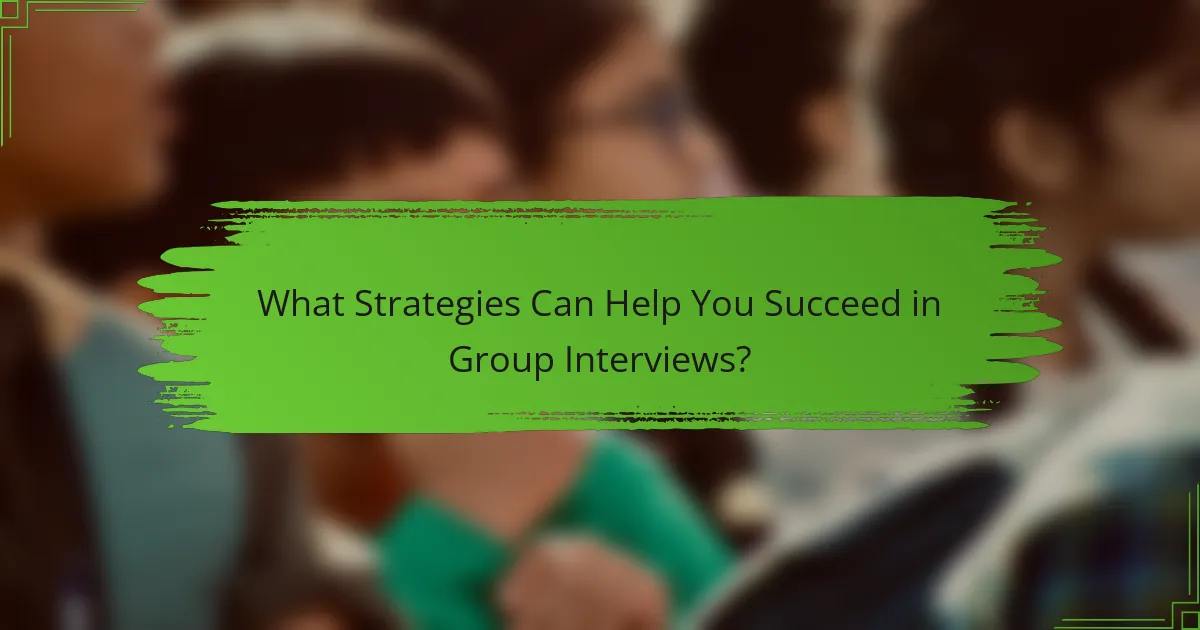
What Strategies Can Help You Succeed in Group Interviews?
To succeed in group interviews, preparation and active participation are essential. Research the institution and its values. Understand the role you are applying for to tailor your responses. Practice common interview questions with peers to build confidence. During the interview, listen actively to others and engage with their ideas. Make eye contact and use positive body language to convey confidence. Speak clearly and concisely to ensure your points are understood. Demonstrating teamwork and collaboration is crucial in a group setting. According to a study by the National Association of Colleges and Employers, employers value communication and teamwork skills highly in candidates.
How can you prepare effectively for a Group Interview?
To prepare effectively for a group interview, research the institution and its values. Understand the role you are applying for and the skills required. Practice common group interview questions with peers. Develop your communication skills to express your thoughts clearly. Familiarize yourself with teamwork dynamics and how to collaborate with others. Dress professionally to make a positive first impression. Arrive early to demonstrate punctuality and reduce anxiety. Lastly, follow up with a thank-you note to express appreciation for the opportunity.
What research should you conduct before the interview?
Conduct research on the college’s programs and values before the interview. Understanding the specific courses and extracurricular activities offered can help you align your responses. Review the college’s mission statement to grasp its core values. Familiarize yourself with recent news or achievements related to the college. This knowledge demonstrates your genuine interest. Research potential interviewers if possible, as knowing their backgrounds can aid in tailoring your conversation. Additionally, practice common interview questions to refine your answers. Engaging in this research enhances your confidence and preparedness.
How can you practice for Group Interview scenarios?
To practice for group interview scenarios, engage in mock interviews with peers. This method simulates the group dynamics and pressures of actual interviews. Prepare specific responses for common questions to enhance your confidence. Focus on articulating your thoughts clearly and concisely. Additionally, observe group interactions to understand how to contribute effectively. Seek feedback from participants to identify areas for improvement. Utilize online resources or workshops that specialize in group interview techniques. Consistent practice helps build necessary skills and familiarity with the format.
What communication skills are essential for Group Interviews?
Active listening is essential for group interviews. This skill allows candidates to understand others’ viewpoints. It fosters effective interactions and encourages collaboration. Clear verbal communication is also crucial. Candidates must articulate their thoughts concisely and confidently. Non-verbal communication plays a significant role too. Body language, eye contact, and [censured] expressions convey engagement and interest. Additionally, adaptability is important. Candidates should respond appropriately to different group dynamics. Finally, assertiveness helps in expressing opinions without dominating discussions. These skills collectively enhance a candidate’s performance in group interviews.
How can you demonstrate leadership during a Group Interview?
To demonstrate leadership during a group interview, actively engage with other candidates. Initiate discussions by asking insightful questions. Encourage quieter members to share their thoughts. Acknowledge the contributions of others to foster a collaborative environment. Maintain a positive attitude and exhibit confidence in your responses. Use body language that conveys openness and attentiveness. According to a study by the Harvard Business Review, effective leaders in group settings create an atmosphere conducive to teamwork. This approach not only highlights your leadership skills but also enhances group dynamics.
What techniques can help you engage with other candidates?
Active listening is a key technique to engage with other candidates. It involves fully concentrating on what others are saying. This shows respect and encourages open communication. Asking open-ended questions can also foster engagement. Questions that require more than yes or no answers promote discussion. Sharing personal experiences relevant to the conversation can help build connections. It creates a sense of camaraderie among candidates. Additionally, using positive body language is essential. Nodding and maintaining eye contact can convey interest. Participating in group activities or discussions can enhance interaction. This allows candidates to showcase their teamwork skills.
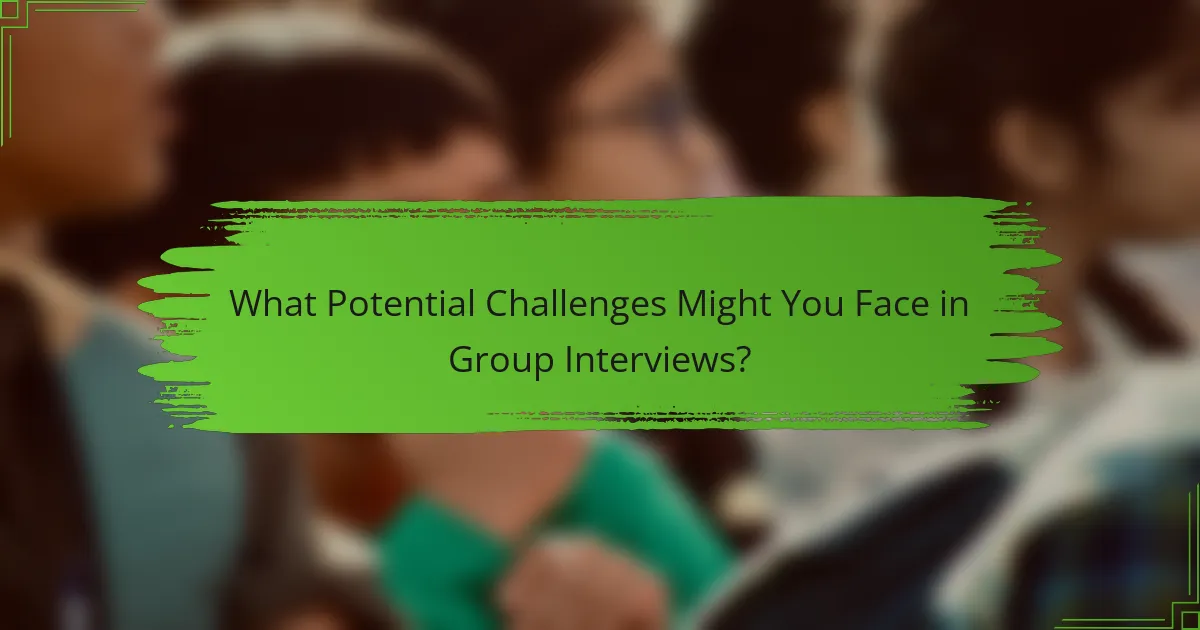
What Potential Challenges Might You Face in Group Interviews?
Group interviews can present several challenges. One challenge is managing dominant personalities. Some candidates may overshadow others, making it difficult for quieter individuals to express themselves. Another challenge is the pressure of simultaneous evaluation. Interviewers assess multiple candidates at once, which can create a high-stress environment. Additionally, candidates may struggle with collaboration. Working together on tasks can lead to conflicts or miscommunication. Time management is also a challenge, as limited time can restrict thorough responses. Lastly, the presence of multiple interviewers can lead to inconsistent questioning, causing confusion about expectations. Each of these challenges can impact a candidate’s performance in a group interview setting.
What common difficulties do candidates encounter in Group Interviews?
Candidates often encounter difficulties such as anxiety and intimidation during group interviews. The presence of multiple interviewers and candidates can heighten stress levels. Candidates may struggle to articulate their thoughts clearly in a competitive setting. Time constraints can also limit responses, causing rushed answers. Additionally, candidates might find it challenging to engage with others while maintaining their individuality. Group dynamics can lead to dominant personalities overshadowing quieter candidates. Miscommunication or misunderstandings can occur due to overlapping conversations. Finally, candidates may face difficulty in showcasing their unique strengths in a collaborative environment.
How can nervousness impact your performance in a Group Interview?
Nervousness can significantly hinder your performance in a group interview. It may lead to difficulty in articulating thoughts clearly. Nervous candidates often struggle to engage with others effectively. This can result in missed opportunities to showcase relevant skills. Body language may become closed off or unconfident. Research indicates that anxiety can impair cognitive function, affecting decision-making. A study published in the Journal of Applied Psychology found that high anxiety levels correlate with lower performance ratings. Thus, managing nervousness is crucial for presenting oneself positively in a group interview setting.
What strategies can help you manage difficult group dynamics?
Establishing clear communication is essential for managing difficult group dynamics. Encourage open dialogue among group members to express their thoughts. Set ground rules for respectful interaction to maintain a positive atmosphere. Facilitate the discussion by guiding the conversation and addressing conflicts promptly. Use active listening to validate each member’s perspective. Implement team-building activities to foster collaboration and trust. Monitor group interactions to identify issues early and intervene when necessary. Research indicates that effective group management enhances overall performance and satisfaction in collaborative settings.
How can you overcome challenges during a Group Interview?
To overcome challenges during a group interview, actively engage with all participants. Listening attentively shows respect and helps you understand different perspectives. Contributing relevant points demonstrates your knowledge and confidence. Use body language to convey openness and enthusiasm. Additionally, practice common group interview scenarios beforehand. This preparation builds your comfort level and response speed. Researching the institution and its values can also guide your contributions. By being well-prepared, you reduce anxiety and enhance your performance.
What mindset shifts can help you approach challenges positively?
Adopting a growth mindset can significantly help you approach challenges positively. This mindset emphasizes viewing challenges as opportunities for learning and development. Research by Carol Dweck indicates that individuals with a growth mindset are more resilient in the face of setbacks. They tend to embrace difficulties rather than avoid them. Additionally, reframing negative thoughts into positive affirmations can enhance your outlook. Instead of thinking, “I can’t do this,” consider, “I will learn from this experience.” This shift encourages proactive problem-solving. Focusing on effort over outcome fosters a sense of control and reduces anxiety. Lastly, surrounding yourself with supportive peers can reinforce positive attitudes toward challenges. Engaging in collaborative discussions can provide new perspectives and solutions.
How can you seek feedback post-interview to improve?
To seek feedback post-interview, directly contact the interviewer or admissions committee. Send a polite email expressing gratitude for the opportunity. Request specific feedback on your performance and areas for improvement. Many interviewers appreciate candidates’ initiative to learn and grow. According to a survey by Jobvite, 70% of recruiters are open to providing feedback when asked. This approach can yield valuable insights that enhance future interviews.
What are the Best Practices for Group Interviews?
Best practices for group interviews include preparation, active participation, and respectful communication. Candidates should research the institution and understand its values. Practicing common interview questions can enhance confidence. During the interview, candidates must listen attentively and engage with others. They should showcase their unique perspectives without dominating the conversation. It’s essential to maintain eye contact and use positive body language. Following up with a thank-you note can reinforce interest in the institution. These practices can lead to a more successful group interview experience.
How can you effectively follow up after a Group Interview?
To effectively follow up after a group interview, send a personalized thank-you email to each interviewer. This email should express gratitude for the opportunity and reference specific discussions from the interview. Personalization demonstrates attentiveness and reinforces your interest in the position. Aim to send this email within 24 to 48 hours after the interview. Research indicates that timely follow-ups can enhance your candidacy. Following up also provides a chance to reiterate your qualifications and fit for the role. Make sure to keep the tone professional and concise.
What lessons can you learn from Group Interview experiences?
Group interview experiences teach valuable lessons about teamwork and communication. Participants learn to express their ideas clearly and concisely. They also develop skills in listening and responding to others. Additionally, group interviews highlight the importance of collaboration. Candidates must work together to solve problems or discuss topics. This experience fosters adaptability in dynamic settings. It also reveals how to manage different personalities and viewpoints. Understanding group dynamics is crucial for success in such interviews.
Group interviews in college admissions are evaluations where multiple candidates are assessed simultaneously, allowing admissions officers to observe interactions and gauge teamwork, communication skills, and leadership potential. This article covers the differences between group and traditional interviews, the typical format of group interviews, and the roles of interviewers and candidates. It also explores the advantages of group interviews for admissions committees, strategies for candidates to succeed, potential challenges faced, and best practices for preparation and follow-up. Overall, the article provides a comprehensive guide to navigating group interviews effectively.
